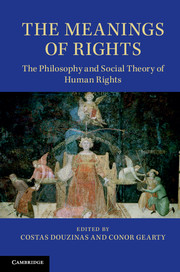Book contents
- Frontmatter
- Contents
- Notes on contributors
- Introduction
- Part I Finding foundations
- Part II Law, rights and revolution
- Part III Rights, justice, politics
- 9 From “human rights” to “life rights”
- 10 Democracy, human rights and cosmopolitanism: an agonistic approach
- 11 Plural cosmopolitanisms and the origins of human rights
- Part IV Rights and power
- Index
- References
10 - Democracy, human rights and cosmopolitanism: an agonistic approach
Published online by Cambridge University Press: 05 June 2014
- Frontmatter
- Contents
- Notes on contributors
- Introduction
- Part I Finding foundations
- Part II Law, rights and revolution
- Part III Rights, justice, politics
- 9 From “human rights” to “life rights”
- 10 Democracy, human rights and cosmopolitanism: an agonistic approach
- 11 Plural cosmopolitanisms and the origins of human rights
- Part IV Rights and power
- Index
- References
Summary
How can we envisage the relation between democracy, human rights and cosmopolitanism from an agonistic perspective? To examine this question, I am going to bring together a series of reflections that I have developed in my previous work to show how the approach that I have been elaborating addresses some of the key issues in those debates. Since I cannot expect everybody to be familiar with my work, I will begin by delineating the basic tenets of my theoretical framework. It has first been elaborated in Hegemony and Socialist Strategy, co-written with Ernesto Laclau. In this book, we argue that the two concepts necessary to grasp the nature of the political are ‘antagonism’ and ‘hegemony’. Both notions point to the need to acknowledge the dimension of radical negativity that manifests itself in the ever-present possibility of antagonism which impedes the full totalization of society and which forecloses the possibility of a society beyond division and power. This, we claim, requires coming to terms with the lack of a final ground and the undecidability that pervades every order, visualizing society as the product of a series of practices whose aim is to establish order in a context of contingency. In our vocabulary, this means recognizing the hegemonic nature of every kind of social order. We call ‘hegemonic practices’ the practices of articulation through which a given order is created and the meaning of social institutions is fixed. Every order is the temporary and precarious articulation of contingent practices. Things could have been otherwise and every order is predicated on the exclusion of other possibilities, it is always the expression of a particular configuration of power relations. What is at a given moment accepted as the ‘natural’ order, jointly with the common sense that accompanies it, is the result of sedimented hegemonic practices; it is never the manifestation of a deeper objectivity that would be exterior to the practices that brought it into being. Every order is for that reason susceptible of being challenged by counter-hegemonic practices, practices which attempt to disarticulate its particular power configuration in order to install another form of hegemony.
- Type
- Chapter
- Information
- The Meanings of RightsThe Philosophy and Social Theory of Human Rights, pp. 181 - 192Publisher: Cambridge University PressPrint publication year: 2014
References
- 6
- Cited by



